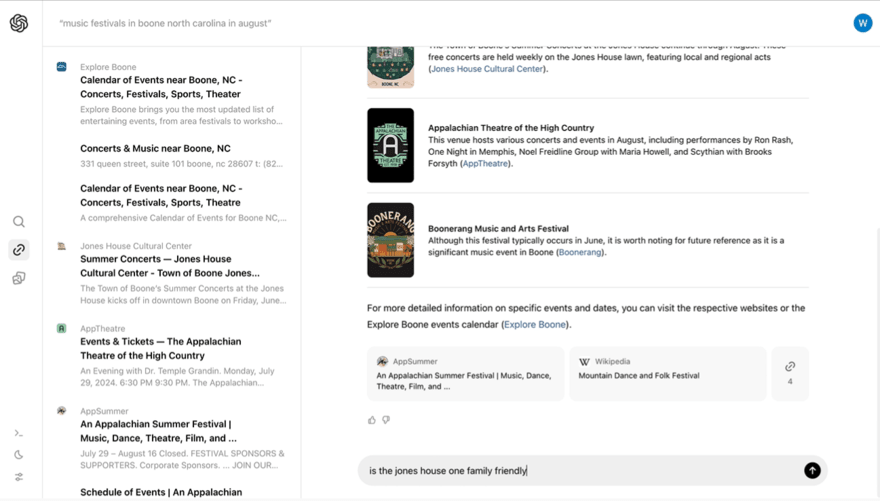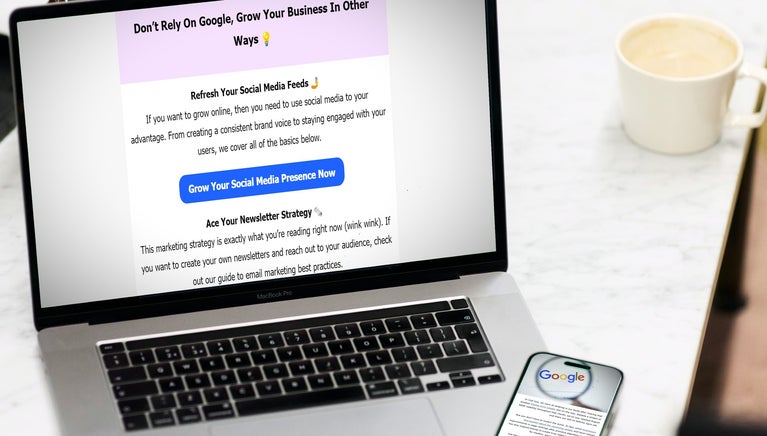What Is SearchGPT and How Might It List Your Site?
If you click to purchase a product or service based on our independent recommendations and impartial reviews, we may receive a commission. Learn more

OpenAI has announced the AI-powered SearchGPT prototype, a new search solution. SearchGPT will work quickly to browse the web and pull together a fitting result for your query.
SearchGPT aims to go head-to-head with Google, which has recently introduced AI to search with its AI Overviews feature and looks to release the next major core update in the coming weeks.
Since OpenAI’s tool is still in a testing period, improvements and changes are likely before it’s officially integrated into the ChatGPT suite. Plus, as with all AI tools, there’s certainly room for error which OpenAI will need to address. However, the conversational tool hopes to make the search experience easier to navigate for all.
What Does SearchGPT Mean For Your Website?

OpenAI hopes to build a “thriving ecosystem of publishers and creators” by spotlighting their content and websites in the SearchGPT experience. But, what does this mean for the average site owner? Will your site appear in SearchGPT results?
The announcement addressed the topic, explaining that OpenAI will be partnering with publishers to improve the SearchGPT tool as it develops. This would give websites the opportunity to shape how their content appears in results, providing helpful and visual responses to users and offering more transparency to website owners.
I spoke with Audience and SEO Development Strategist, Caitlin Hathaway, to discuss the impact on website owners:
As the announcement has just gone live, there is still a lot left to confirm with SearchGPT. With further examples of how it’s used and the type of answers it shows for queries, we will get a better understanding of how to optimize for it. SearchGPT emphasized that it could answer users with queries surrounding developing news, so it looks like publishers may benefit. SearchGPT will answer users’ questions with timely and updated information from the web through surfacing publishers in results and prominently cite and link to them in results.
From the initial SearchGPT examples released by OpenAI, I’ve had a look at the sites it references in its “Best Tomatoes to grow in Minnesota” showcase, to see what types of sites it surfaces in queries and if there’s a chance for smaller sites.
The sites it surfaced included:
- Extension at the University of Minnesota – an authoritative, local university
- Garden Magazine – a small, US niche gardening site monetized through ads
- Gardening Dad – a small US niche affiliate gardening site
When looking on Bing search for the same “Best Tomatoes to grow in Minnesota” search, it surfaced all of the above sites throughout the first page of that search. There may be some hope for smaller sites to surface in SearchGPT queries and not just publishers.
I’d advise you to look into optimizing your site to appear in organic search results, particularly Bing if you want the best chance of appearing in SearchGPT queries, as that is the search engine used by OpenAI’s ChatGPT.

It’s too early to determine the impact of SearchGPT and the role it’ll play in the future of search, but it could be a step in the right direction for small sites and publishers. After struggling to stay abreast of Google’s algorithm updates and SERP volatility in recent months, listings in SearchGPT might be a welcome change for some.
How Can You Use SearchGPT?
SearchGPT is currently being tested by a select group of individuals and publishers, and there is no official release date.
OpenAI said this in the announcement:
“We’re launching to a small group of users and publishers to get feedback. While this prototype is temporary, we plan to integrate the best of these features directly into ChatGPT in the future.”
For any interested parties, OpenAI encourages individuals and businesses to sign up for the waitlist.
Feedback in the Community
Sam Altman, the CEO of OpenAI, shared the update on X:
“we will learn from the prototype, make it better, and then integrate the tech into ChatGPT to make it real-time and maximally helpful. i have been pleasantly surprised by how much I prefer this to old-school search, and how quickly i adapted.”
Naturally, SEO professionals and publishers have had a lot to say about the news. Jes Scholz, an organic marketing consultant, discussed the impact:
“This isn’t ground breaking. More a UI upgrade to include nice imagery and clearer links. The improved linking is truly welcomed, but let’s not overhype it. This is a PR play. It boosts adoption of ChatGPT and fuels news cycles questioning “what about Google” (often negatively). But at the heart of it all. You should have shifted to a “Search it up” rather than “Google it” SEO strategy over a year ago. SearchGPT serves as a reminder to focus on reaching your audience beyond Google SERPs alone.”
Neil Patel spoke about his disappointment on X too:
“… Don’t get me wrong, ChatGPT is great, and so are many of their other products. But SearchGPT seems like a mediocre search engine. I get that this is just the first variation, but most people (maybe not marketers) are happy with Google’s results. So if you want to displace them, especially with it being an old and saturated market, you have to create something better.”
And, SearchGPT isn’t without its issues – even this early in the game. The Atlantic exposed errors in the announcement, highlighting incorrect concert dates for a musical festival query. So, will it manage to take hold in the search landscape? How will it evolve over the testing period?
Despite speculation and uncertainty for now, we’ll have to wait and see what impact SearchGPT has on the industry.

Leave a comment